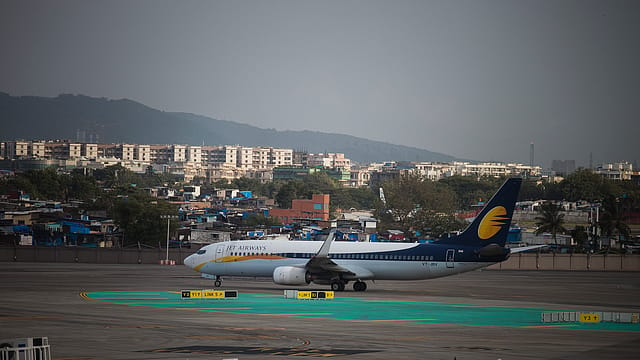Jet Airways: One man’s pain is another’s gain
ADVERTISEMENT

One man’s pain is another’s gain. One can see the idiom play out in the stock markets in the case of Jet Airways, which has been temporarily shut down for want of operational funds, and its competition.
The temporary shutdown of Jet Airways, announced on April 17, has led share prices of SpiceJet and IndiGo to touch a 52-week high on April 18, while Jet Airways’ stock touched its lower circuit of ₹217.7 a share and fell over 33% to ₹161.7, from its closing price of ₹241.85 on April 16. Against that, SpiceJet jumped by nearly ₹20 to touch ₹152.6 (up by 15%) in early trade on April 18. Similarly, stock price of IndiGo peaked to ₹1,650 (up over 4%) from the previous day’s close of ₹1,583.15. However, the stock lost steam in later part of the trading day as the price corrected to day’s low of ₹1,544.10 in post-lunch trade session.
That Jet Airways and the unsolved conundrum around the future of the airline is the cause of positive price spurts for its completion is a no-brainer. Earlier in the month, in a report, Gagan Dixit and Rachael Alva, analysts with Mumbai-based Elara Capital had projected that the three airlines would post a cumulative profit after tax of ₹500 crore in the quarter ended March 2019, compared to a cumulative loss of ₹900 in the quarter ended December 2018.
The analysts expect a 4% YoY yield increase for IndiGo and a 2% YoY for SpiceJet, due to capacity reduction of Jet Airways. “Indigo would benefit more than SpiceJet over the fares increase, as it has more exposure to the metro routes where fares have gone up sharply, owing to Jet Airways financial woes,” Dixit and Alva noted. “SpiceJet fares would underperform over that of Indigo as SpiceJet has aggressively increased its available seat kilometers (ASKM) capacity in the domestic routes by nearly 25% YoY, wherein most growth was seen in category II & III routes,” the duo added.
However, Dixit and Alva reiterated that SpiceJet was their top pick in the aviation sector, due to little competition in regional routes and strong fleet order book. “SpiceJet is better placed to hire outgoing Jet Airways pilots, as both carriers are flying similar Boeing-737 aircrafts in domestic routes,” they noted further.
In an April 15 report from SBI Capital’s institutional equity research desk, analysts Santosh Hiredesai and Chalasani Teja said they expected SpiceJet to revise its target price to ₹175 a share (47% upside from the stock price of ₹119 on the day of their report). This upward revision overruled their earlier target of ₹154 a share (over 63% higher than the prevailing share price of ₹94) set just 11 days earlier on April 4.
Hiredesai and Teja believe that while all of Jet’s peers that have weathered the storm stand to gain, SpiceJet is best placed to capitalise on the situation due to its fleet structure—it is the only other Boeing operator in the market for narrow body aircraft, which is the mainstay for the domestic/short haul international network. “When Kingfisher, which had an all-Airbus fleet, undertook major rationalisation in 2012/2013 (fleet down from peak of 67 to 12) IndiGo benefited the most, the duo noted.
They also highlight that trained pilots are ‘type’ rated for a particular model and need six-eight months before they are certified (by DGCA) to fly a different type of aircraft. “So, it is no surprise that SpiceJet is adding 16 737 NG aircraft (mostly those re-possessed by lessors from Jet Airways) under a dry lease arrangement; it could also find it easy to absorb the existing workforce (pilots, engineering and ground staff) and quickly deploy these planes to lock-in slots/bilaterals.”
According to an analyst who did not wish to be identified, in a scenario of Jet Airways not being able to revive its operations, there is increased incentive for other airlines to snap up slots in metro airports and increase capacity on the high-yielding metro routes, the top ten routes in India. “Most of these airports are not expanding or will expand only after five-seven years, as is the case in Mumbai, which makes these slots precious so there will be logically a scramble to get them,” says the analyst.
For passengers, the cost of air travel is expected go up, especially during the high-demand summer season. Analysts believe that this will be a negative for the consumer but in the short-term.
Meanwhile, questions linger on the future of Jet Airways, where experts believe that the outcome will depend on the kind of negotiations the bank has with the potential investors. The potential investor might not be willing to take on Jet Airways’ entire debt, forcing the banks to take a haircut. “The banks might not be willing to do that. It will require hefty negotiations between the banks and the potential investor. It’s all contingent on that,” says the analyst.
Additional reporting by Arnika Thakur